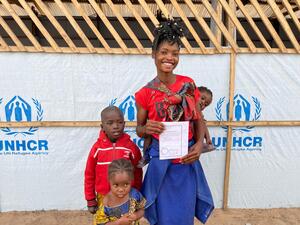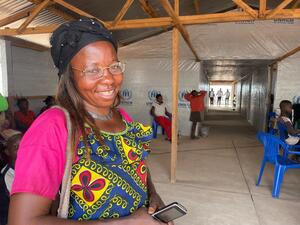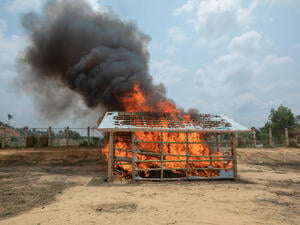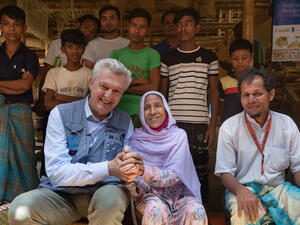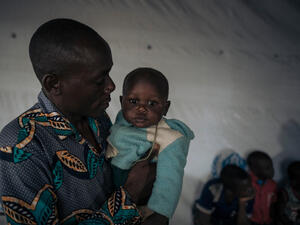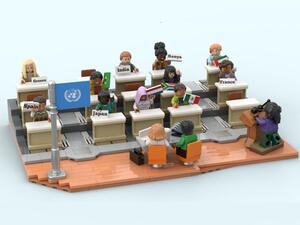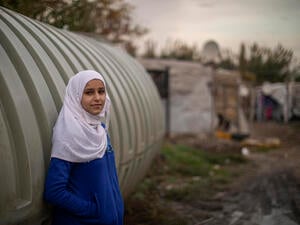UNHCR working to help conclude three African refugee situations
UNHCR working to help conclude three African refugee situations
UNHCR is implementing a set of comprehensive strategies aimed at closing three of Africa's longstanding refugee situations, namely those involving Angolan, Liberian and Rwandan refugees.
These strategies-which were first announced in 2009 by the High Commissioner to UNHCR's governing body, the Executive Committee- aim at finding solutions for as many Angolan, Liberian and Rwandan refugees as possible, be it in their countries of origin or asylum.
Solutions include scaled up voluntary repatriation together with assistance packages to help former refugees reintegrate, or securing an alternative legal status that would allow them to continue to reside in the country of asylum. After decades in exile, many Angolan, Liberian and Rwandan refugees have established strong ties with their host communities, including through marriage. UNHCR hopes that countries of asylum will convert refugee status into residency permits for such persons, including ultimately citizenship when domestic legislation allows. In West Africa, for example, Liberians can obtain residence and work permits, allowing them to remain in the country of asylum as ECOWAS citzens.
Cessation clauses are built into the 1951 Refugee Convention and the 1969 Organization of African Unity Refugee Convention. They allow refugee status to end once fundamental and durable changes have taken place in the country of origin and the circumstances that led to refugee flight no longer exist. This is the case for all three countries of orgin. UNHCR recommends that cessation apply for Angolan refugees who fled the country as a result of the conflicts between 1961 and 2002; for Liberian refugees who fled the civil wars from 1989 and 2003; and for Rwandan refugees who fled between 1959 and 1998.
The application of cessation by States does not mean that all Angolan, Liberian and Rwandan refugees automatically lose their refugee status or that the countries of origin no longer produce any refugees. Cessation will not apply to refugees who still have well-founded fear of persecution, nor to refugees who have compelling reasons for not wanting to go back home because of past persecution. UNHCR is working closely with governments to protect asylum rights in these cases, even as we implement the comprehensive strategies. Cessation would also not apply to any Angolan, Liberian or Rwandan refugees who have pending asylum claims.
Furthermore, UNHCR appeals to governments to properly and fully determine all new or pending claims by Angolans, Liberians and Rwandans fairly, regardless of when they were filed.
UNHCR recommends that States continue to implement all aspects of the comprehensive strategies leading to cessation of refugee status by 30 June 2012 for Angolans and Liberians, and by 30 June 2013 for Rwandans. In Angola, 40 years of conflict that displaced millions of Angolans, finally ended in a lasting peace agreement in 2002. While the majority of Angolan refugees have since returned to their country of origin, more than 131,000 remain in exile, mainly in the Democratic Republic of the Congo and Zambia. Almost half of them have indicated their wish to return to Angola.
In Liberia, a period of civil wars that started in 1989 ended in 2003, with the signing of the Comprehensive Peace Agreement and the departure of then-president Charles Taylor from office. The conflicts claimed 200,000 lives and displaced hundreds of thousands of Liberians. While the majority of the Liberian refugees have returned home, some 63,000 remain in exile, mainly in Côte d'Ivoire.
In Rwanda, peace and stability have essentially prevailed since 1999. The vast majority of Rwandans refugees fled as a result of the 1994 genocide and its aftermath, including armed clashes in northwestern Rwanda in 1997 and 1998, the last time the country experience generalized violence. Over the past years, the majority of Rwandan refugees have returned to Rwanda, but close to 100,000 still remain in exile in some forty countries, mainly in Africa.
UNHCR stresses the importance of bringing protracted refugee situations to an end so that refugees can resume their normal lives. It is incumbent upon the international community to invest in a decent closure of longstanding refugee situations. Assisting these refugees in finding solutions will also help prevent larger mixed migrations movements.
For further information on this topic, please contact:
In Dakar: Helene Caux on mobile +221 77 333 12 91
In Geneva: Fatoumata Lejeune-Kaba on mobile +41 79 249 3483

